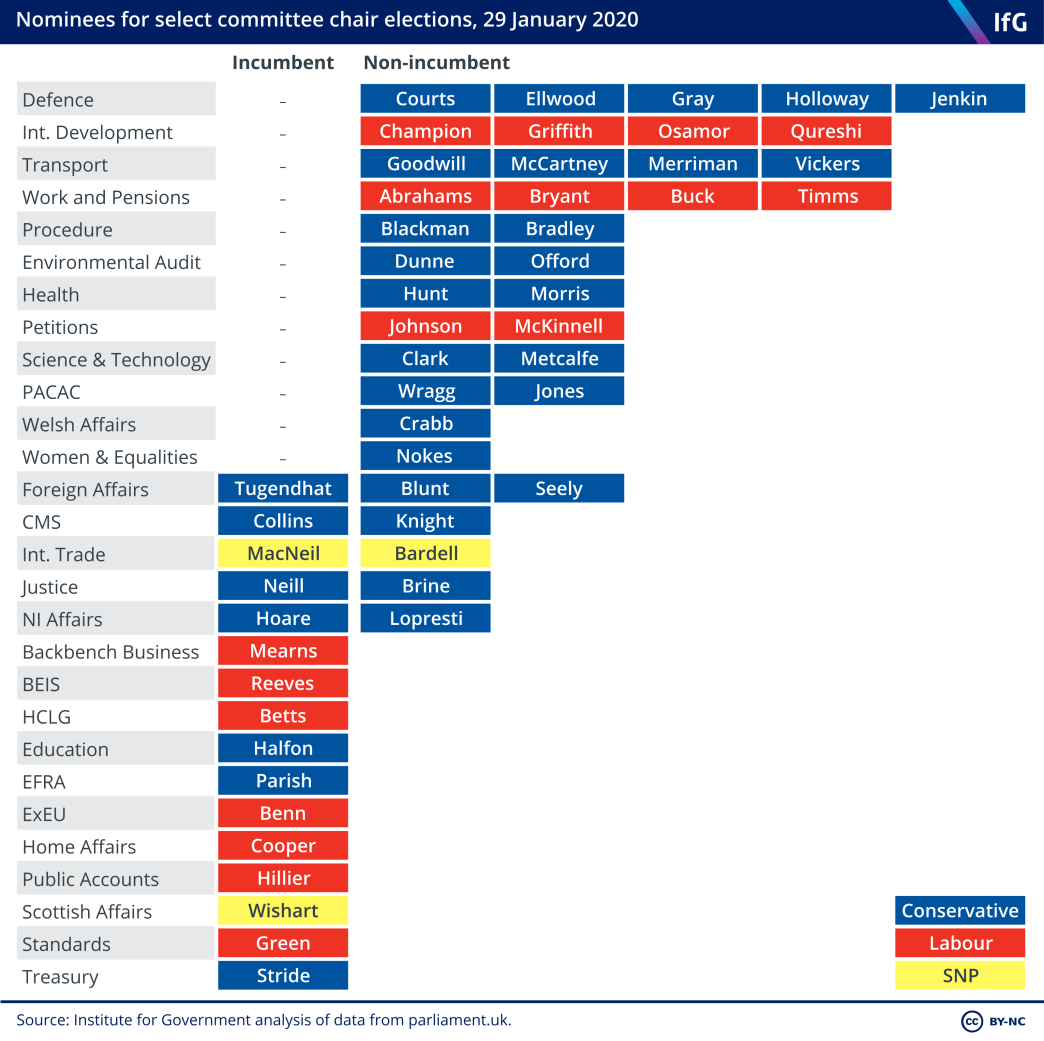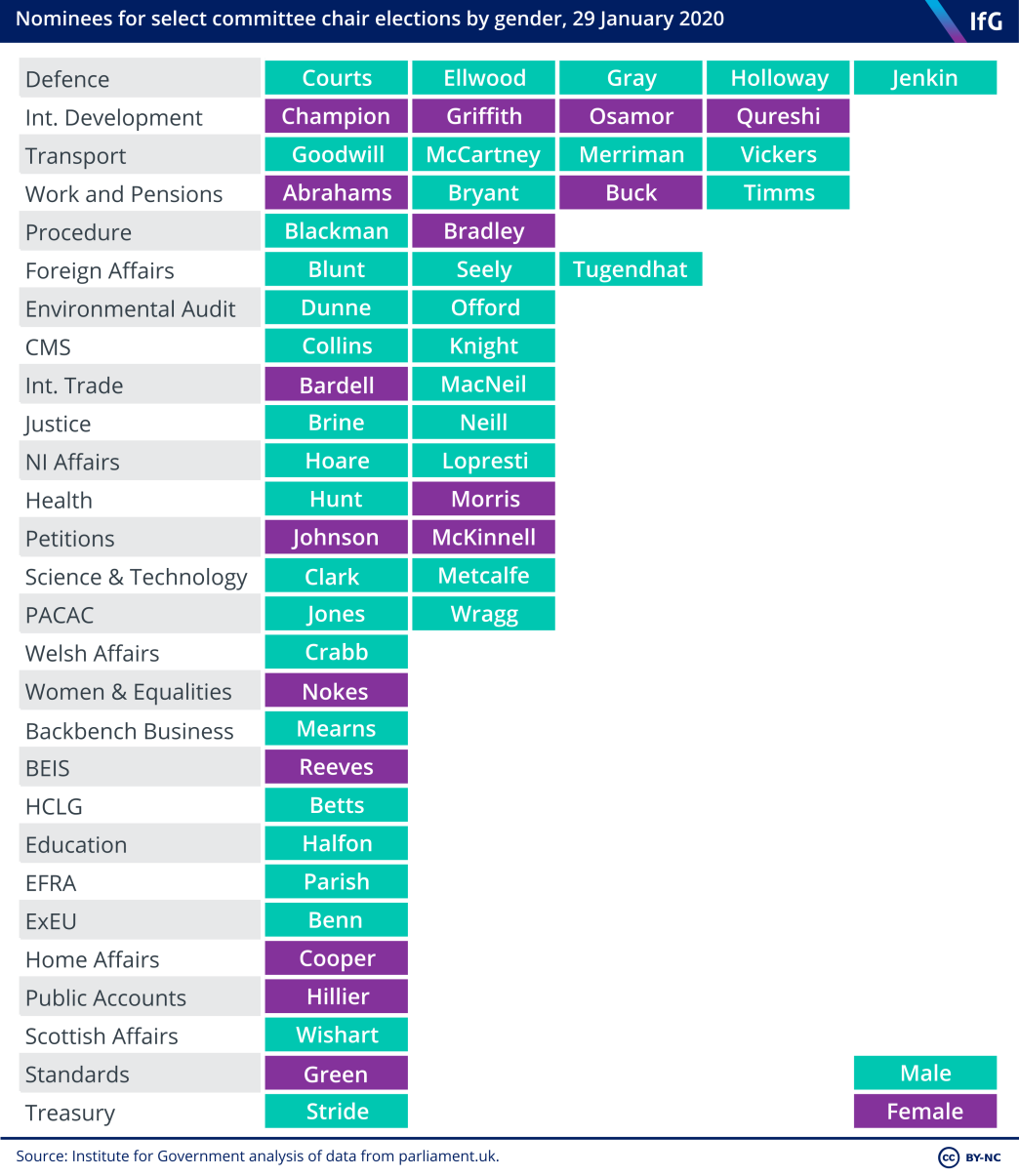Who is standing in the select committee chair elections?
The House of Commons is electing the chairs to 28 select committees for the new parliament.
The House of Commons is electing the chairs to 28 select committees for the new parliament. Alex Nice examines who has chosen to stand for these important scrutiny roles.
Following last year’s general election, the government asked MPs to extend the timetable for the election of select committee chairs. Once this is complete, the political parties will run internal elections for the remaining members of each committee. Depending on how speedily they do so, it remains possible that these key scrutiny mechanisms may not be up and running before March.
Changes to parliamentary arithmetic have affected the allocation of committees
The big increase in the number of Conservative MPs following the 2019 election has shifted the allocation of committee chairs – which reflects the balance of parties in the Commons – in favour of the government. Of the 28 committees for which chairs are elected, Conservative MPs will chair 16 in this parliament (up from 13 at the start of the last parliament). Labour MPs will chair 10 committees (down two – losing Transport and Environmental Audit to the Conservatives). The Science and Technology Committee, previously chaired by Liberal Democrat MP Norman Lamb, will now be chaired by a member of the Conservative Party. Members of the Scottish National Party will continue to chair the Scottish Affairs and International Trade committees.
There will be continuity for some select committees
Of the 16 incumbent committee chairs that wish to remain in post, 11 have been elected unopposed. The exceptions are Foreign Affairs, Culture Media and Sport, International Trade, Justice, and Northern Ireland Affairs.
But changes to parliament’s standing orders have also increased the continuity in chairs. The rules previously imposed a term limit on select committee chairs, but the government asked MPs to agree to set this restriction aside for this parliament. This has allowed Labour’s Clive Betts, who has chaired the Housing Communities and Local Government Committee (HCLG) since 2010, to stand unopposed for another term. Sir Bernard Jenkin, another incumbent chair who would soon have been caught by the term limit, is stepping down from the Public Administration and Constitutional Affairs Select Committee and is instead attempting to win the chair of the Defence Committee.
The number of vacancies means a competitive race in some committees
Twelve committee chairs from the 2017-19 parliament have either stepped down or ceased to be MPs. As a result, the number of committees with new chairs is going to be higher than the start of the last parliament in 2017, when only eight new committee chairs were elected.
In the competitions where there is no incumbent, committee chair elections have attracted several candidates. There are five Conservative nominees for the Defence Committee and four respectively for the International Development (Labour), Transport (Conservative), and Work and Pensions (Labour) Committees.

Select committees continue to attract experienced candidates
The select committee chair elections continue to attract high-profile candidates with considerable frontbench experience. Of the 53 candidates standing, seven are former secretaries of state, eleven are former ministers of state and ten are former shadow secretaries of state. Fewer than half the candidates have no frontbench experience. But most notable among the candidates are the former Cabinet ministers now seeking to scrutinise the departmental briefs they recently covered in office. If Greg Clark is elected as chair of the Science and Technology Committee then he would be covering an area he oversaw as secretary of state for Business, Energy and Industrial Strategy until last July, while Jeremy Hunt would be scrutinising a department he ran until July 2018 if he became the chair of the Health and Social Care Committee.
There is a big gender disparity between Labour and the Conservatives
The new parliament has the highest ever proportion of women – 220 MPs are women, or 34% of the total. There is a similar gender balance among the nominees for committee chairs. Sixteen of 53 candidates are women, or 30% of the total. However, there is a big disparity between the parties. Only three (9%) of the Conservative candidates for committee chair elections are women, compared to 12 of 17 candidates (70%) for the Labour party.

The scrutiny provided by select committees will be all-important as the government embarks upon its agenda. The MPs chosen by their colleagues to chair these committees will face a busy parliamentary term delving into the detail of detail of policy and its implementation.
Electing chairs is the first step, but the sooner Parliament can get the committees up and running, the better.
- Supporting document
- Being an effective select committee member.pdf (PDF, 284.26 KB)
- Keywords
- Select committees Parliamentary scrutiny
- Political party
- Labour Conservative
- Legislature
- House of Commons
- Publisher
- Institute for Government